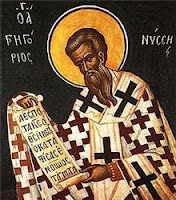Why "contra fatum"?
 |
| Gregory of Nyssa |
Analogously, this blog is intended as a criticism of modern rationalism(s), whether in the form of political, technological, sociological or economical abstractions (modern astrology!), religious or spiritual-metaphysical ideas such as divine predestination and determinism. All lack a sense that human beings are created in the image of God, with freedom, infinite value, and a reason that cannot be reduced to the formulas of rationalism.
Christus Victor!
On the positive side the blog is a defense of the classical idea of the atonement effected by the incarnation, life, death and resurrection of Jesus Christ: Rather than being a sacrifice to an angry god in dire need of satisfaction,
 | |
| Icon depicting the classical view of Christ as victorious over death, rather than as a substitutionary sacrifice paid to the Father. |
According to the classical view God is not the author of evil. God is love. Created in the image of God, human beings have freedom to turn from Him. This leads to the loss of freedom, and ultimately death. Because of sin, the whole cosmos is entangled in the powers, authorities and spiritual forces of evil (Eph. 6:12). It is from these powers that God, out of his immense love, sets us free, by paying a ransom to death with his only-begotten son."And having disarmed the powers and authorities, he made a public spectacle of them, triumphing over them by the cross." (Col 2:15)
"After we had thus freely sold ourselves to the deceiver, He who of His goodness sought to restore us to liberty could not, because He was just too, for this end have recourse to measures of arbitrary violence. It was necessary therefore that a ransom should be paid, which should exceed in value that which was to be ransomed; and hence it was necessary that the Son of God should surrender Himself to the power of death. God's justice then impelled Him to choose a method of exchange, as His wisdom was seen in executing it.” (Gregory of Nyssa, The Great Catechism)This is not just a matter of theological details. Our view of the atonement profoundly reflects our view of God and what it means for human beings to be in and relate to the world.
God does not use violence. Hence, it is no wonder that the classical idea of the atonement is especially prominent amongst radicals such as modern Anabaptists (Mennonites) and other peace churches (e.g. Quakers): God does not need a violent sacrifice, but gives everything he has to free us through self-sacrificial love rather than violence. If we are serious in proclaiming that Christ is victorius over the authorities, powers and principalities, this also has ethical and political implications.
God is an-archos, without beginning. Hence as a matter of words the Kingdom of God is anarchy. But there is more to it. Christ's victory is a real victory over sin and death, for the individual as well as for the world at large. And since the ruling principle of the Kingdom of God is love, not force or violence, we should learn to see any system of ideology and oppression as belonging to the principalities and the powers of death, even if these have been subordinated by God and are being used temporarily to keep peace and order, and as a means to bring us to a conviction of our inability to save ourselves.
Enjoy your reading!
